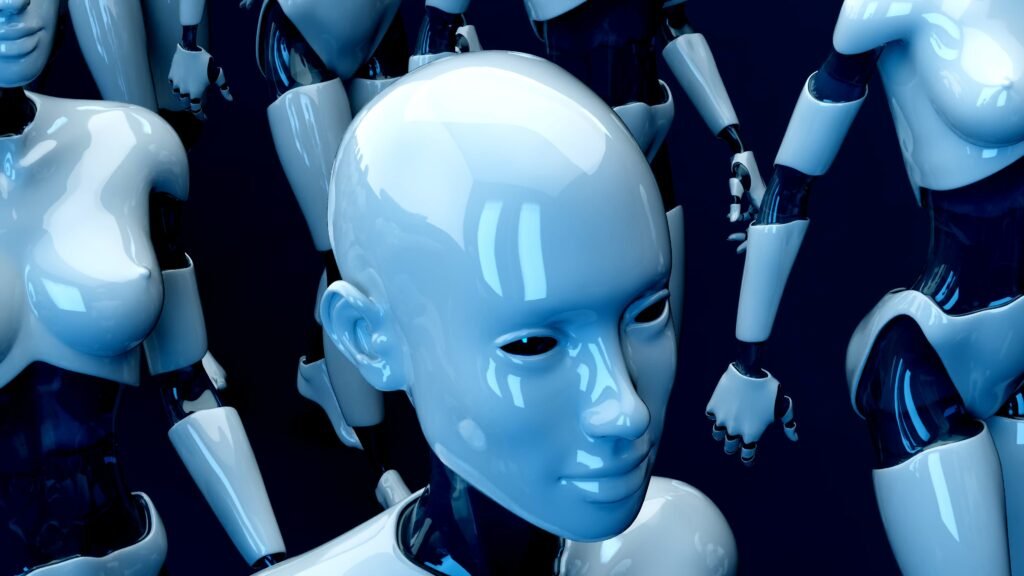Have you ever wondered about the brilliant minds behind the creation of artificial intelligence? This article aims to shed light on the incredible individuals responsible for bringing this cutting-edge technology to life. From computer scientists to mathematicians, various visionaries have contributed their expertise and dedication to shaping the field of AI. Join us on a journey to uncover the names and stories of the minds that have revolutionized the world of artificial intelligence.

Historical Background
The Beginning of AI Research
Artificial Intelligence (AI) has a rich and fascinating history that dates back to the mid-20th century. The birth of AI research can be traced back to the Dartmouth Conference in 1956, where a group of scientists and researchers gathered to explore the potential of creating intelligent machines. This conference marked the beginning of a new era in scientific exploration and set the stage for future developments in AI.
Influential Figures in AI Development
Several influential figures have played a significant role in the development of AI. One of the most notable figures is Alan Turing, often referred to as the “father of AI.” His work on computable numbers and the concept of a universal machine laid the foundation for the field of AI. Another influential figure is John McCarthy, who coined the term “artificial intelligence” and is credited with the birth of AI as a discipline.
Early Concepts of AI
The Turing Test
One of the early concepts in AI is the Turing Test, proposed by Alan Turing in 1950. The Turing Test is a test of a machine’s ability to exhibit intelligent behavior equivalent to, or indistinguishable from, that of a human. This test sparked a debate about whether machines can truly exhibit human-like intelligence, leading to further exploration and research in the field.
Logic and Symbol Manipulation
Early AI researchers focused on developing systems that could manipulate symbols and logic to simulate human reasoning. They believed that if a machine could manipulate symbols and logic in a human-like manner, it could exhibit intelligent behavior. This approach, known as “symbolic AI,” laid the groundwork for later advancements in AI research.
Early Machine Learning
Early machine learning techniques also emerged during the early stages of AI research. Researchers explored the idea of creating systems that could learn from data and improve their performance over time. These early machine learning algorithms laid the foundation for the modern-day machine learning techniques that are now widely used in various applications of AI.
Birth of Artificial Intelligence
The Dartmouth Conference
the Dartmouth Conference in 1956 is considered the birthplace of AI. At this conference, researchers aimed to create machines that could mimic human intelligence and solve complex problems. The term “artificial intelligence” was coined during this conference, marking the beginning of a field dedicated to the study of creating intelligent machines.
Foundations of AI Research
Following the Dartmouth Conference, AI research gained momentum and began to attract more attention from scientists and researchers. Funding for AI research increased, leading to the establishment of dedicated research institutions and the formation of academic programs focused on AI. These developments laid the foundations for further advancements in the field.
Contributions from Computer Science
Alan Turing: The Father of AI
Alan Turing’s contributions to AI are vast and significant. His work on the foundations of computation and the concept of a universal machine laid the groundwork for AI research. Turing’s famous Turing Test also sparked debates and discussions that continue to shape the field. His ideas and concepts continue to influence AI research and development to this day.
John McCarthy and the Birth of AI as a Discipline
John McCarthy’s contributions to AI cannot be understated. He coined the term “artificial intelligence” and played a crucial role in organizing the Dartmouth Conference. McCarthy’s efforts helped establish AI as a distinct discipline and laid the groundwork for further research and development in the field. His visionary ideas and contributions continue to shape the direction of AI research.

Cognitive Psychology and AI
Bridging Human Intelligence and Machine Intelligence
Cognitive psychology has had a significant impact on AI research. Researchers recognized the importance of understanding human cognition and intelligence in order to create intelligent machines. By studying human cognitive processes, researchers aimed to bridge the gap between human intelligence and machine intelligence. This interdisciplinary approach has contributed to advancements in areas such as natural language processing, perception, and decision-making in AI systems.
The Impact of Cognitive Psychology on AI
The insights gained from cognitive psychology have played a crucial role in the development of AI. Researchers have used cognitive models and theories to inform the design and development of intelligent systems. For example, understanding how humans process and understand language has led to advancements in natural language processing and machine translation. The impact of cognitive psychology on AI continues to drive innovation and improve the capabilities of intelligent machines.
Machine Learning and Neural Networks
The Emergence of Machine Learning
Machine learning has witnessed significant advancements in recent years, but its roots can be traced back to the early days of AI research. Early machine learning techniques focused on creating systems that could learn from data and make predictions or decisions based on that learning. These early developments set the stage for more sophisticated machine learning algorithms and techniques that we rely on today.
Neural Networks and Deep Learning
Neural networks are at the forefront of modern AI research. Inspired by the structure and function of the human brain, neural networks are computational models that can learn from data and make predictions or decisions. Deep learning, a subset of neural networks, has gained prominence in recent years due to its ability to process large amounts of data and learn complex patterns. Neural networks and deep learning have revolutionized areas such as image recognition, natural language processing, and autonomous systems.

AI in Popular Culture
Fiction and Sci-Fi Influence
Artificial intelligence has captured the imagination of writers and filmmakers, leading to its portrayal in various works of fiction and science fiction. From Isaac Asimov’s “I, Robot” to Philip K. Dick’s “Do Androids Dream of Electric Sheep?” (the inspiration for the movie Blade Runner), the idea of intelligent machines has been a recurrent theme in popular culture. These depictions have both fueled public fascination with AI and influenced public perception of its potential capabilities.
Movies and TV Shows that Shaped Public Perception of AI
Movies and TV shows have played a significant role in shaping public perception of AI. Films like “The Matrix” and “Ex Machina” have explored the ethical and existential implications of AI, while shows like “Black Mirror” have depicted the potential dystopian consequences of advanced AI technologies. These portrayals have sparked discussions around AI ethics and raised awareness about the potential risks and benefits of AI.
Recent Advancements in AI
Big Data and Increased Processing Power
Recent advancements in AI have been powered by two critical factors: the availability of big data and increased processing power. The abundance of data allows AI systems to learn from diverse sources and make more accurate predictions. Furthermore, the exponential growth of processing power has enabled AI algorithms to analyze and interpret these vast amounts of data at an unprecedented speed. These advancements have propelled AI into various applications, ranging from healthcare and finance to self-driving cars and virtual assistants.
The Role of Companies in AI Development
Companies have played a pivotal role in the recent advancements in AI. Technological giants like Google, Microsoft, and Amazon have invested heavily in AI research and development, driving innovation and pushing the boundaries of what AI can achieve. Additionally, startups and smaller companies have contributed to the AI landscape by developing niche applications and pushing the adoption of AI in various industries. The collaboration between academia, industry, and startups has accelerated the pace of AI development and brought cutting-edge AI technologies to the forefront.
Ethical Concerns and Future Development
The Ethics of AI
As AI continues to advance and become more integrated into various aspects of society, ethical concerns have arisen. Issues such as privacy, bias, job displacement, and the ethical treatment of intelligent machines are just a few of the many ethical considerations that need to be addressed. The development of AI must be guided by ethical frameworks that prioritize transparency, accountability, and the well-being of all stakeholders.
Potential Future Directions of AI Development
The future of AI holds immense potential for transformative advancements. Areas such as explainable AI, ethical AI, and AI governance are gaining prominence as researchers and policymakers explore ways to ensure responsible and beneficial AI development. The integration of AI with emerging technologies such as augmented reality and quantum computing also presents exciting opportunities for AI to enhance human capabilities and solve complex problems.
AI and Human Collaboration
Augmenting Human Capabilities
AI has the potential to augment human capabilities and enhance our ability to solve complex problems. Rather than replacing humans, AI can serve as a powerful tool that complements and supports human intelligence. For example, AI-powered medical diagnosis systems can assist doctors in making more accurate diagnoses, leading to improved patient outcomes. The collaboration between humans and AI can lead to breakthroughs in various fields and unlock new possibilities for innovation.
AI as a Tool for Solving Complex Problems
AI’s problem-solving capabilities can be leveraged to tackle some of the world’s most pressing challenges. From climate change and poverty to healthcare and education, AI has the potential to revolutionize how we address these complex problems. By harnessing the power of AI algorithms and data analytics, policymakers, researchers, and practitioners can make more informed decisions and develop effective solutions. AI can contribute to a more sustainable and equitable future by providing valuable insights and assisting in decision-making processes.
In conclusion, AI has come a long way since its inception. From its early concepts to recent advancements, AI has become integrated into our daily lives and holds immense potential for the future. By understanding the historical background, exploring influential figures and concepts, and considering ethical concerns, we can navigate the complex landscape of AI development. AI is not just the creation of a few individuals; it is a collective effort that requires collaboration, responsible development, and a focus on human-centered solutions. With the right approach, AI can be harnessed as a powerful tool to augment human capabilities and tackle the world’s most pressing challenges.




